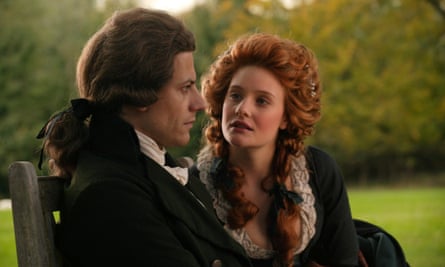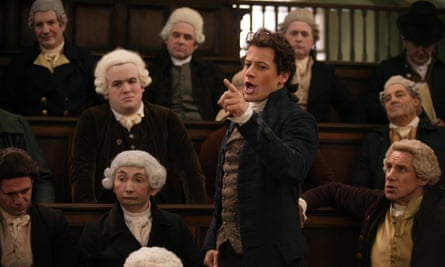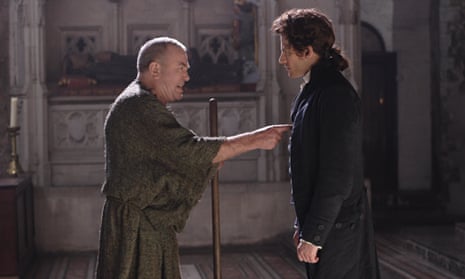Amazing Grace (2006)
Director: Michael Apted
Entertainment grade: C–
History grade: A–
William Wilberforce was a leading figure in the political campaign to abolish the slave trade in Britain in the late-18th and early-19th centuries.
Imperialism
“Great Britain was the mightiest empire on Earth and its empire was built on the backs of slaves,” says a title card at the beginning of Amazing Grace. Good to see someone acknowledge that. (Anyone interested in the links between Britain and slavery is advised to explore the excellent Legacies of British Slave-Ownership project created by University College London.) Stopping on a blasted heath, an earnest gentleman (Ioan Gruffudd) stops two carriage drivers who are beating a black horse. Regrettably, this may be symbolic. “I’ve seen him speak in London!” says one expositionally, indicating the earnest gentleman. “That’s William Wilberforce!” The horse expires, possibly from despair.
Sorrow
The screenplay is overwhelmed by exposition. “Your last bill was defeated because four of your loyal supporters took free tickets to a comic opera rather than stay to vote,” Henry Thornton tells Wilberforce, who, one would imagine, had already noticed that. After a series of failed abolition bills, Wilberforce is hooked on laudanum and hallucinates contextless images of African children in chains. The Thorntons try to fix him up with right-on sugar-boycotting babe Barbara Spooner (Romola Garai), but he’s trapped under the weight of his cares and doesn’t have the energy to flirt. In real life, Wilberforce disapproved of the popular campaign to refuse sugar.

Villains
Meanwhile, parliamentary villains Banastre Tarleton (Ciarán Hinds) and the Duke of Clarence (Toby Jones) thwart any attempts to end slavery. Film fans may recall Banastre Tarleton as the model for genocidal maniac Colonel Tavington in Mel Gibson’s absurd American independence drama The Patriot. In real life, Tarleton was a nasty piece of work. Though he denied responsibility for some of his troops’ worst excesses during the American war of independence, he emerges from the history books as a careless, violent thug. Amazing Grace is right that he was a passionate supporter of the slave trade when he served as MP for Liverpool. He also had a long affair with the writer and actress Mary ‘Perdita’ Robinson, erstwhile mistress of the Prince of Wales.
The Duke of Clarence – who was the Prince of Wales’s brother and later became King William IV – was an outspoken defender of slavery, and also richly deserves the pasting he gets in this movie. In his maiden speech in the House of Lords, he asserted that “the negroes were not treated in the manner which had so agitated the public mind” – ie beaten and tortured – and that Caribbean slaves instead lived “in a state of humble happiness”. He was completely wrong.

People
There are a host of fine performances in Amazing Grace, including Benedict Cumberbatch as a strikingly well-observed William Pitt the Younger, Rufus Sewell as an inexplicably alcoholic Thomas Clarkson, and Albert Finney as John Newton. Haunted by his past as a slave-trader on the Middle Passage, Newton has written the hymn Amazing Grace, converted to Christianity, and become a sackcloth-wearing penitent. This is not quite true – Newton continued being a slave trader after he had converted to Christianity, did not speak out against slavery until 30 years after he left the trade, and became a rector.
Race
What you might notice about these characters is that they are all white. Amazing Grace has one substantial black character: Olaudah Equiano (played by Senegalese singer Youssou N’Dour), a former slave who achieved great fame on the publication of his bestselling memoir in 1789. Beyond his fleeting appearance, Amazing Grace is all about how slavery damaged the British, whether they were traumatised ex-slavers, heroic yet tormented abolitionists, or the corrupted souls supporting the trade. Historically speaking, this film has done plenty of research – maybe even too much, because it can’t stop explaining the complexities of things such as the Royal Navy’s right to intercept foreign trade shipping under neutral flags. It just feels rather quaint for a movie made in 2006 to focus so unremittingly on how awful slavery was for white people.
Verdict
Amazing Grace’s strong performances sometimes lift its plodding pace, but it’s a stodgy and old-fashioned historical drama.

Comments (…)
Sign in or create your Guardian account to join the discussion